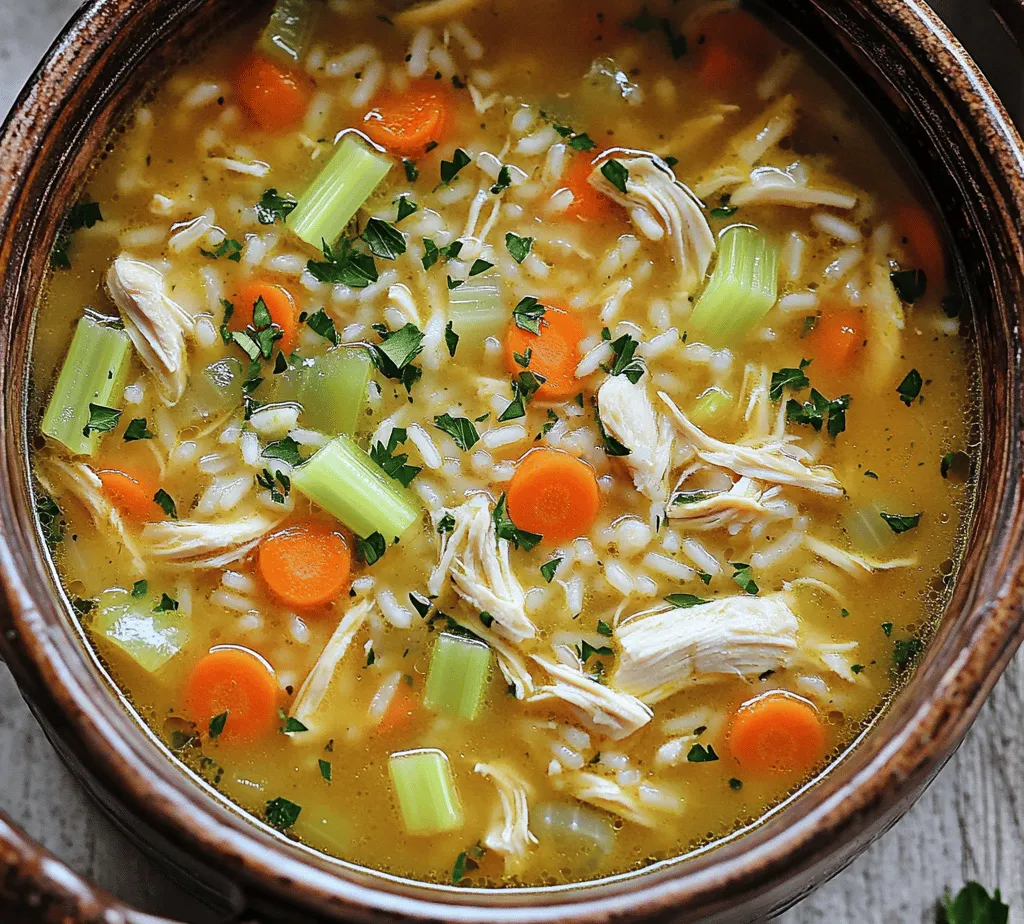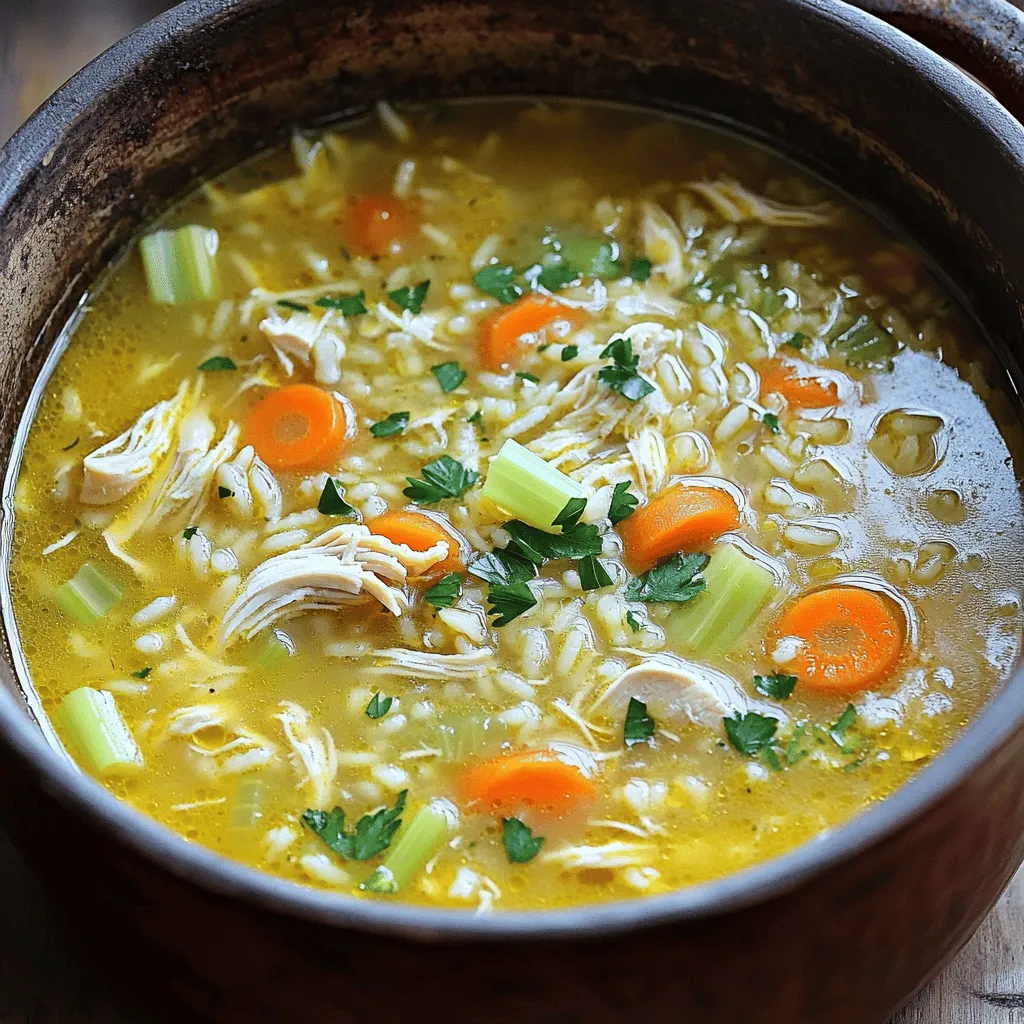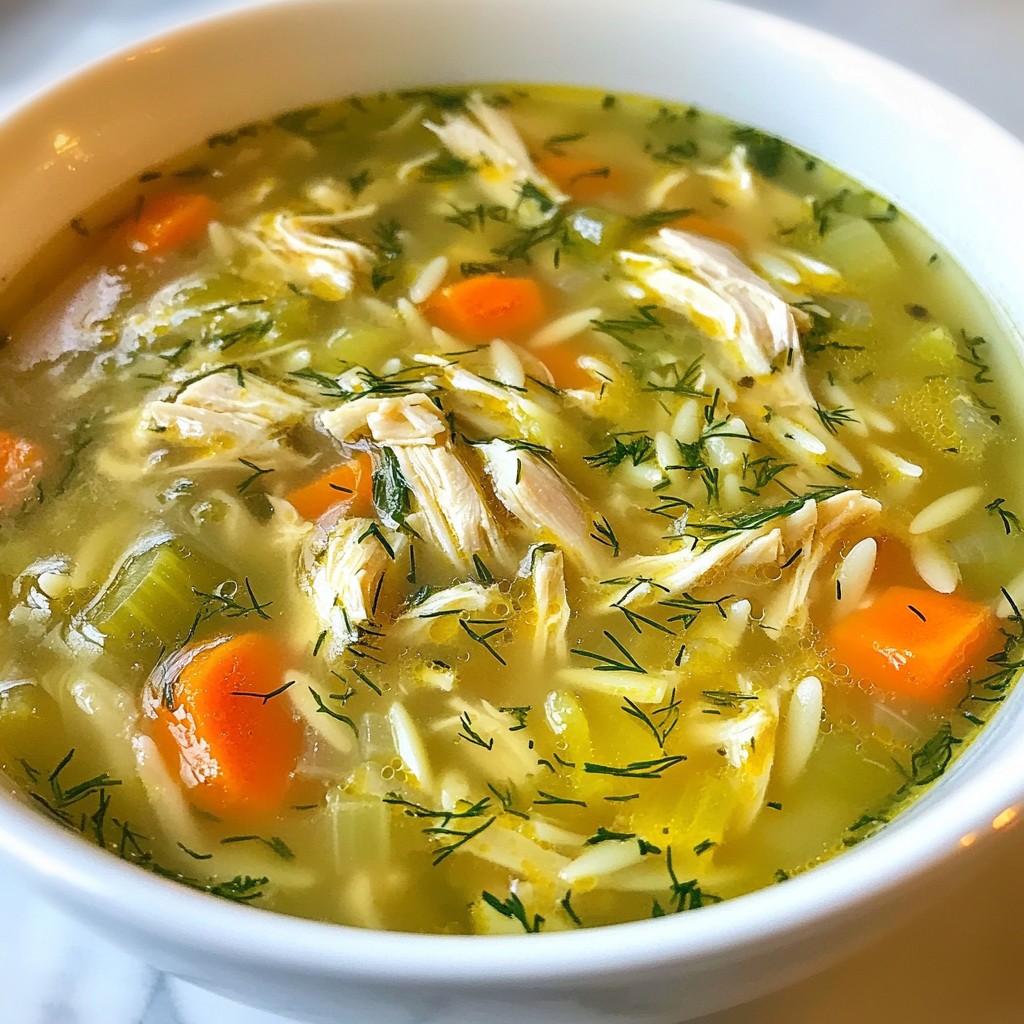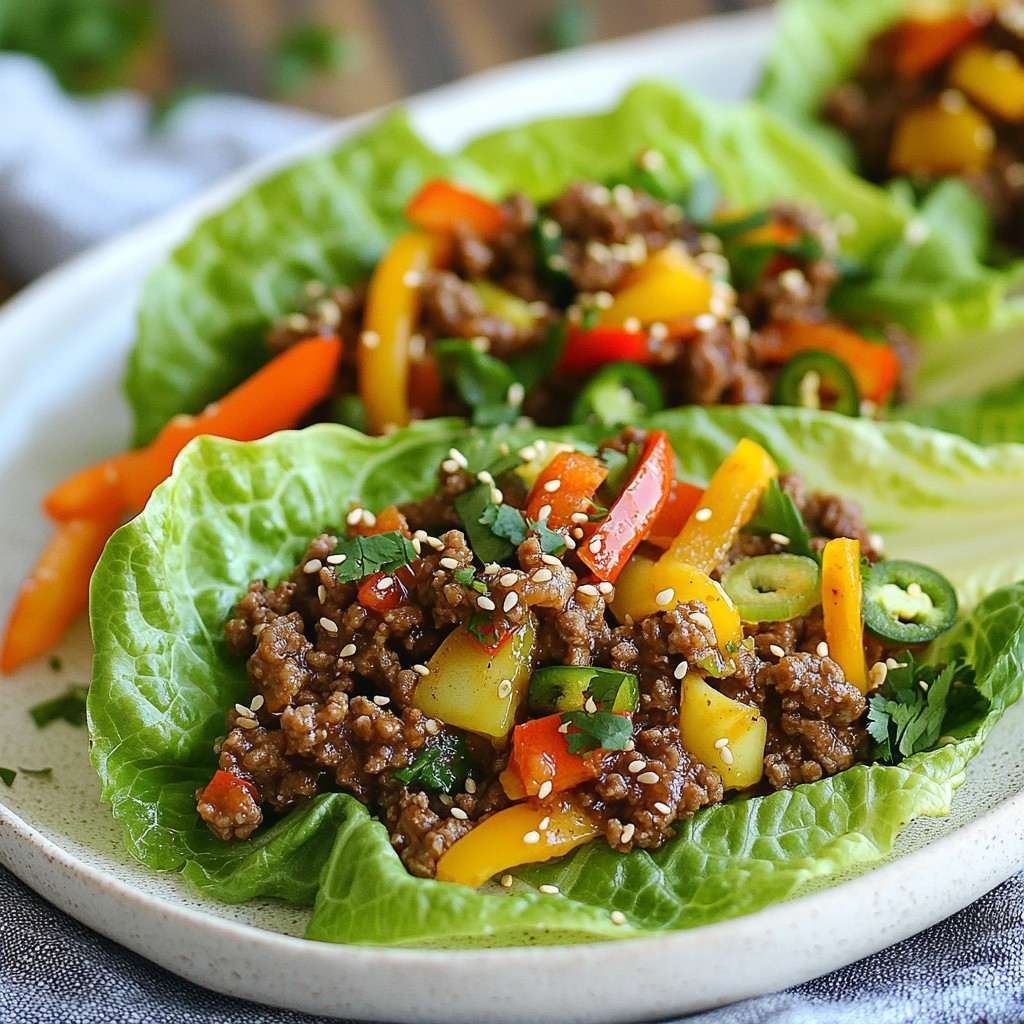Introduction
When chillier days arrive or when we seek solace from life’s challenges, few things can offer the same warmth as a steaming bowl of soup. Chicken and Rice Soup stands out as a quintessential comfort food that nourishes not just the body, but also the spirit. This Comforting Chicken and Rice Soup recipe is a delightful blend of tender chicken, aromatic vegetables, and fluffy jasmine rice, all harmoniously simmered to create a dish that evokes feelings of home and togetherness.
As we embark on the journey of crafting this heartwarming soup, we will delve into its nutritional benefits, the emotional connections tied to such recipes, and offer tips for variations and storage. Whether you’re feeling under the weather or just in need of a cozy meal, this soup is sure to provide comfort and satisfaction.
The Essence of Comfort Food
Defining Comfort Food: Why Chicken and Rice Soup Fits the Category
Comfort food is often defined by its ability to evoke a sense of warmth, nostalgia, and familiarity. It’s the type of food that brings back fond memories of family gatherings and home-cooked meals shared around the dinner table. Chicken and Rice Soup embodies this definition perfectly. The heartiness of the chicken, combined with the soothing qualities of rice and the richness of the broth, creates a dish that feels like a warm hug on a cold day.
The Emotional Connection to Food: Memories Tied to Soup Recipes
Many of us have cherished memories tied to soup recipes—perhaps a beloved grandmother’s kitchen filled with the enticing aroma of simmering ingredients or a cozy dinner on a rainy evening. These experiences create emotional connections that enhance the enjoyment of the meal. For many, Chicken and Rice Soup is synonymous with love, care, and comfort. It is often passed down through generations, with each family adding their unique twist, making it a personal and treasured recipe.
Nutritional Benefits of the Ingredients: Why Chicken, Rice, and Vegetables Are Wholesome
The ingredients that make up Chicken and Rice Soup are not only delicious but also nutritious. Chicken is an excellent source of lean protein, which is essential for muscle repair and overall health. Rice, particularly jasmine rice, provides carbohydrates that supply energy, while vegetables such as onions, carrots, and celery contribute vitamins, minerals, and fiber, promoting digestive health. The combination of these ingredients creates a well-rounded meal that is both satisfying and nourishing.
Gathering Your Ingredients
Overview of the Essential Ingredients
Before diving into the cooking process, it’s crucial to gather all the necessary ingredients. A well-prepared kitchen is key to a smooth cooking experience. Here’s a comprehensive list of the essential ingredients for your Comforting Chicken and Rice Soup:
– Chicken: Boneless, skinless chicken breasts or thighs work best for tenderness.
– Rice: Jasmine rice is preferred for its fluffy texture, but you can substitute with brown rice or white rice.
– Vegetables: Onions, carrots, and celery form the aromatic base of the soup. Fresh garlic adds depth to the flavor.
– Herbs: Fresh thyme and rosemary infuse the soup with a delightful fragrance, while bay leaves enhance the broth’s complexity.
– Broth: Chicken broth serves as the flavorful foundation for the soup. Homemade broth is ideal, but store-bought options work well too.
– Seasonings: Salt and pepper are essential, along with optional additions like lemon juice for brightness.
Importance of Using Fresh Ingredients
Using fresh ingredients is key to achieving the best flavor and texture in your soup. Fresh vegetables not only enhance the taste but also add vibrant colors that make your dish visually appealing. When selecting chicken, look for high-quality cuts, as they will impart better flavor and tenderness to the final dish. Fresh herbs elevate the overall taste profile, making every spoonful a delightful experience.
Substitutions for Dietary Restrictions
For those with dietary restrictions, there are several easy substitutions you can make without sacrificing flavor:
– Gluten-Free: Ensure that the broth you use is gluten-free and opt for rice varieties that meet your dietary needs.
– Vegetarian/Vegan Options: Replace chicken with chickpeas or tofu and use vegetable broth as a base. You can also add more vegetables to create a hearty alternative.
– Low-Sodium: Use low-sodium chicken broth and adjust the salt to your preference to keep the soup heart-healthy.
Step-by-Step Preparation of Chicken and Rice Soup
Preparing the Base: Sautéing Vegetables
The first step in crafting your Comforting Chicken and Rice Soup is preparing the aromatic base. Start by heating a large pot or Dutch oven over medium heat. Add a drizzle of olive oil and allow it to warm before adding your chopped onions. Sauté the onions until they become translucent and fragrant, which should take about 3-4 minutes.
Next, introduce the diced carrots and celery to the pot. These veggies not only contribute to the soup’s flavor but also add a delightful crunch. Sauté the mixture for an additional 5-7 minutes until the vegetables soften and develop a harmonious blend of aromas.
The Role of Onion, Carrots, and Celery in Flavor Development
Onion, carrots, and celery, often referred to as the “holy trinity” of cooking, are essential for building the foundation of flavor in many soups. The sweetness of the onions, the earthiness of the carrots, and the slight bitterness of celery create a balanced flavor profile that serves as the perfect canvas for the chicken and broth. This combination is what makes Chicken and Rice Soup so deeply satisfying.
Infusing Flavors: The Significance of Garlic, Thyme, and Rosemary
Once the vegetables are tender, it’s time to infuse additional flavors. Mince 2-3 cloves of garlic and add them to the pot, sautéing for about 1 minute until fragrant. Garlic will enhance the savory notes of the soup, creating a rich depth of flavor.
Next, add fresh thyme and rosemary—about 1 teaspoon of each. If using dried herbs, reduce the quantity to about half. The aromatic qualities of these herbs will elevate your soup, filling your kitchen with an irresistible scent that beckons family members to the dinner table.
Building the Broth: Techniques for Creating a Rich and Flavorful Base
After the vegetables and herbs have been sautéed, it’s time to build the broth. Pour in 6 cups of chicken broth and bring the mixture to a gentle simmer. This is where the flavors meld together, creating a rich, comforting base. If you have homemade broth, now is the time to use it, as the depth of flavor will be unparalleled.
For an added layer of richness, consider incorporating a bay leaf at this stage. Allow the soup to simmer gently for about 10 minutes, which gives the herbs and aromatics time to infuse their flavors into the broth.
Cooking the Rice and Chicken: Timing and Temperature for the Perfect Texture
Once your broth is simmering beautifully, it’s time to add the chicken and rice. If you’re using boneless chicken breasts or thighs, cut them into bite-sized pieces for even cooking. Add the chicken to the pot and let it cook for about 10-15 minutes until it is fully cooked and tender.
During the last 10 minutes of cooking, add 1 cup of rinsed jasmine rice to the pot. Jasmine rice cooks quickly and will absorb the flavors of the broth beautifully. Stir occasionally to prevent sticking, and monitor the soup closely to ensure the rice achieves the perfect tender texture without becoming mushy.
Final Touches: Incorporating Lemon Juice and Seasoning to Taste
As your soup nears completion, it’s essential to adjust the seasoning to your liking. Taste the broth, and add salt and pepper as needed. For a touch of brightness, squeeze in the juice of half a lemon. This acidity will enhance the overall flavor and balance the richness of the chicken and broth.
Give the soup a final stir, and allow it to simmer for an additional 2-3 minutes to meld the flavors together. Your Comforting Chicken and Rice Soup is now ready to serve, inviting you and your loved ones to gather around the table for a meal that truly warms the heart.
Stay tuned for the next part of this article, where we will explore tips for best results, variations to suit any palate, and answers to common questions regarding this beloved recipe.

Serving Suggestions and Pairings
When it comes to enjoying your comforting chicken and rice soup, the right accompaniments can elevate the experience. Here are some perfect pairings and creative presentation ideas that will make your meal even more delightful.
Perfect Accompaniments
1. Fresh Bread: A warm, crusty loaf of sourdough or a soft dinner roll is an excellent choice to dip into the soup, adding a satisfying crunch and texture.
2. Salads: A vibrant garden salad or a classic Caesar salad pairs wonderfully with chicken and rice soup. The crisp greens add a refreshing contrast to the warm, hearty soup.
3. Other Side Dishes: Consider serving with roasted vegetables or a side of sautéed greens like spinach or kale for an extra nutritional boost. You can also include a cheese platter or antipasto for a more elaborate meal.
Creative Presentation Ideas
– Serve in Bread Bowls: For a fun twist, hollow out small bread loaves and fill them with the soup. This not only makes for an attractive presentation but also gives you delicious, edible bowls to enjoy.
– Garnish with Fresh Herbs: Enhance the visual appeal by garnishing each bowl with freshly chopped parsley, dill, or chives. A sprinkle of black pepper or a drizzle of olive oil can also add a touch of sophistication.
– Engaging Serving Style: Use mason jars or clear bowls for individual servings, allowing guests to see the colorful ingredients. This can be especially appealing for gatherings and potlucks.
Ideal Occasions for Serving
This chicken and rice soup is versatile enough to suit various occasions. It’s perfect for:
– Family Gatherings: Serve it as a comforting centerpiece during family dinners, where everyone can share stories and enjoy a hearty meal together.
– Sick Days: Known for its soothing properties, this soup is ideal for those feeling under the weather, providing warmth and nourishment that can help speed recovery.
– Cozy Dinners: Whether it’s a chilly evening or a rainy day, this soup creates a cozy atmosphere, making it an excellent choice for casual dinners or a quiet night in.
Nutritional Information and Health Benefits
Understanding the nutritional profile of your chicken and rice soup can help you appreciate its health benefits. Here’s a breakdown of what makes this dish not just comforting, but also nourishing.
Nutritional Breakdown
– Calories: A typical serving of chicken and rice soup contains approximately 250-350 calories, depending on the ingredients used.
– Protein: With chicken as the primary protein source, each serving provides about 20-30 grams of protein, essential for muscle repair and overall health.
– Carbohydrates: The rice adds a good source of carbohydrates, providing energy for daily activities. A serving typically has around 30-40 grams of carbs.
– Vitamins and Minerals: This soup is packed with vitamins (such as Vitamin A from carrots, Vitamin C from celery) and minerals (like potassium from chicken broth), contributing to your daily nutrient needs.
Health Benefits of Each Ingredient
– Chicken: A lean protein source, chicken helps build and repair tissues, while being low in fat if skinless parts are used.
– Rice: A complex carbohydrate, rice provides sustained energy and is gentle on the stomach, making it an excellent choice for those recovering from illness.
– Vegetables: Carrots, celery, and onions not only add flavor but also bring fiber and essential nutrients that support digestion and overall health.
Diet Compatibility
Chicken and rice soup can easily fit into various diets:
– Low-Calorie: By using lean chicken and plenty of vegetables, you can keep the calories in check, making it a great option for weight management.
– High-Protein: With its protein-rich ingredients, this soup is perfect for those looking to increase their protein intake for muscle maintenance or weight loss.
– Gluten-Free: By using rice instead of pasta or bread, this soup is naturally gluten-free, accommodating those with gluten sensitivities.
Variations of Chicken and Rice Soup
One of the beauties of chicken and rice soup is its versatility. You can explore different flavor profiles and ingredient variations to suit your taste preferences.
Exploring Flavor Profiles
– Adding Spices and Herbs: Enhance the flavor by incorporating spices such as cumin, paprika, or turmeric for warmth. Fresh herbs like thyme or rosemary can elevate the taste, giving a fragrant aroma to the soup.
– Citrus Zest: A squeeze of lemon or lime juice just before serving can brighten the flavors, adding a zesty contrast to the richness of the broth.
Protein Alternatives
– Turkey: Substitute chicken with turkey for a similar flavor profile. This is especially great around the holidays when turkey leftovers can be creatively utilized.
– Tofu or Lentils: For a vegetarian or vegan twist, replace chicken with cubed tofu or add lentils for protein. These options are not only nutritious but also offer unique textures to the soup.
Vegetable Additions
– Seasonal Veggies: Feel free to incorporate your favorite seasonal vegetables. Adding peas, corn, or green beans can contribute vibrant colors and additional nutrients.
– Leafy Greens: Stir in some spinach or kale at the end of cooking to increase the soup’s health benefits and add a pop of color.
Storage and Reheating Tips
To ensure you enjoy your chicken and rice soup over multiple meals, proper storage and reheating techniques are essential.
Best Practices for Storing Leftovers
– Cool Before Storing: Allow the soup to cool to room temperature before transferring it to airtight containers. This prevents condensation, which can lead to sogginess.
– Refrigeration: Store in the refrigerator for up to 3-4 days. Ensure the container is sealed well to maintain freshness.
Freezing Chicken and Rice Soup Effectively
– Portion Control: Freeze individual portions in freezer-safe containers or bags. This makes it easy to thaw just what you need without having to defrost the entire batch.
– Labeling: Don’t forget to label your containers with the date and contents. Chicken and rice soup can be frozen for up to 3 months without losing its flavor.
Reheating Methods to Maintain Flavor and Texture
– Stovetop: The best method for reheating is on the stovetop. Pour the soup into a pot, add a splash of water or broth if it appears too thick, and warm over medium heat until heated through.
– Microwave: If you’re short on time, you can use the microwave. Place the soup in a microwave-safe bowl, cover it with a microwave-safe lid, and heat in short intervals, stirring in between to ensure even heating.
Conclusion
In summary, this comforting chicken and rice soup is more than just a recipe; it’s a celebration of flavors, memories, and nourishment. As you prepare and enjoy this dish, you not only satisfy your hunger but also indulge in the comforting embrace of home-cooked goodness. Whether it’s for a family gathering or a quiet evening, this soup is sure to bring warmth and joy to your table.
From its nutritional benefits to the countless variations you can explore, chicken and rice soup is a versatile dish that caters to different preferences and occasions. With simple storage and reheating tips, you can enjoy this delightful soup anytime, ensuring that every bowl is as comforting as the last. So gather your ingredients, ignite your creativity, and savor the experience of making and sharing this timeless dish with loved ones.




